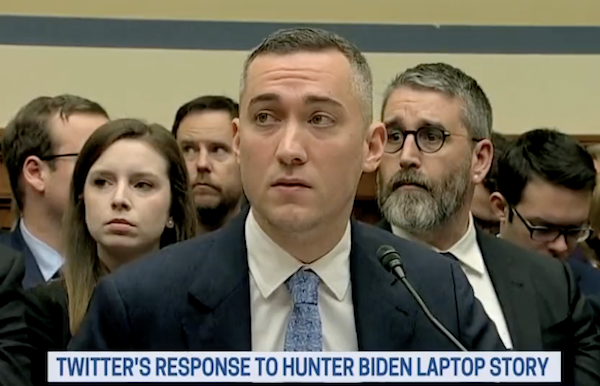Politics
Twitter Executive Admits Under Oath That Twitter Shadow Banned Specific Political Content

Former Twitter executives faced questioning at a House Oversight and Accountability Committee hearing on Wednesday, regarding censorship of the Hunter Biden laptop story.
The chairman of the committee, James Comer, accused Big Tech companies like Twitter of being controlled by individuals who oppose free speech and collaborating with government agencies to censor stories that are unfavorable to President Biden and his family.
Comer said, “We owe it to the American people to provide answers about this collusion to censor information about Joe Biden’s involvement in his family’s business schemes.”
Comer stated that his investigation team had confirmed the existence of collaboration between the government and Big Tech to limit free speech and disrupt democracy, which began before Twitter censored the New York Post articles in October 2020 regarding the contents of the Hunter Biden laptop.
Comer said, “In the months leading up to the laptop story, the FBI advised senior Twitter executives to question the validity of any Hunter Biden story. We also know that one of the witnesses before us today participated in an Aspen Institute exercise in September 2020 on a potential ‘hack and dump’ operation relating to Hunter Biden. Other Big Tech companies and reporters attended as well.”
He continued, “This exercise prepared them for their future collusion to suppress and delegitimize information contained in Hunter Biden’s laptop about the Biden family’s business schemes.”
Comer noted that censorship of political stories during an election would have been unimaginable in the past, but it has become possible due to the biased leadership in Big Tech companies.
Many social media platforms are under the control of people who are hostile to the fundamental American principles of free speech and expression protected in the U.S. Constitution. “We’ve witnessed Big Tech autocrats wield their unchecked power to suppress the speech of Americans to promote their preferred political opinions. Twitter was once one of these platforms — until Elon Musk purchased the company a few months ago …
In the past, Twitter’s employees made censorship decisions on the fly, often not following the company’s own publicly stated policies. It worked hand-in-hand with the FBI to monitor the protected speech of Americans — receiving millions of dollars to do so.
James Baker, former deputy general counsel at Twitter, defended the company by saying that it was not acting as a representative of the state. He also stated that he was not aware of any illegal coordination.
Baker said, “I think the best reading of the law is that as a private entity, the First Amendment protects Twitter and its content moderation decisions.” He continued, “Moreover, I’m aware of no unlawful collusion with or direction from any government agency or political campaign on how Twitter should have handled the Hunter Biden laptop situation.”
Ohio GOP Representative Jim Jordan questioned Baker about whether he had ever discussed the Hunter Biden laptop with the FBI.
Baker responded, “I don’t recall speaking to the FBI at all about the Hunter Biden matter, laptop.”
Vijaya Gadde, former chief legal officer at Twitter, confirmed that the company received requests from federal agencies to remove specific content from the platform, though she did not mention whether the Hunter Biden laptop story was among them.
She said, “There was an ability of preventing something from appearing in one of the tabs of search results.”
She stated that Twitter employs labels such as “do not amplify” to prevent certain tweets from being recommended to users. Gadde explained the various methods that Twitter used to filter content during her time with the company, referring to it as visibility filtering.
Comer expressed concern that the federal government is utilizing Twitter, a private company, to restrict free speech, something it is not allowed to do under the constitution.
Roth claimed, “Twitter made a mistake. “I’ll be the first to admit that we didn’t always get it right. Individual content moderation decisions will always be contentious, and reasonable minds can differ about whether a specific choice was right or wrong.”

